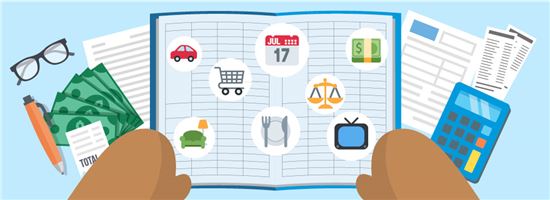Household Budget Calculator
Breaking down your monthly budget can seem daunting. It's an extensive process. Check out this handy calculator to take some of the burden off.
 |
Making a rough estimation of household expenses can be problematic. You somehow end up spending $1,000 more.
How does that happen?
Lack of budgeting. But fixing this doesn't have to cause a headache. Here's a how-to for this easy household budget calculator and tips for future expenses.
How Do I Use the Household Calculator?
The calculator is fairly easy to use. Just follow these simple steps.
- First, input the combined monthly income of your family.
- Then, include any other extra cash you have monthly.
- After this, you can start to input monthly expenses.
- It's best to go in the order they are in the calculator. This way, you'll get the big ones out of the way.
- On the last calculator step (investments), find a calculate button. It will show you how much money you have left.
Expenses to Include in Your Budget
Housing
Housing expenses include monthly payments that keep your house running (and some entertainment). To paint a clearer picture, your rent or mortgage, taxes, HOA fees, utility bills, and insurance. There can be more, but these are the most common among American households.
Food
Food is your groceries, as well as any take-out or dine-out you have during the month.
Transportation
For many people, transportation is car expenses, such as insurance, loans, gas, and maintenance. For others, this might be bus fares, metro fares, or even taxis. Depending on how much you commute, at the end of the month, transportation expenses can be huge.
Health
If you have monthly medicine expenses, you can add them here. Health and dental insurance are also included in health expenses, along with routine doctor appointments.
Education
Education expenses look different for everyone. If your education is ongoing, you may want to include any supplies or books you buy. And of course, tuition fees. If you've finished your schooling, you can include any student loan debt you have left.
Personal Expenses
This is where all the fun stuff goes. Most of your personal expenses will be wants. But some may include needs too, such as childcare, clothing, a mobile phone bill, etc. You can also include your pet's food and vet bill, charitable contributions, movie tickets, new make-up, etc.
Debts
Do you have any leftover credit card debt, or maybe personal loans that you haven't paid off? This is the section you fill out with those. Even something as small as a $20 payment can subtract from your monthly budget.
Investments
Lastly, you can add your savings. These are things such as the emergency fund, college savings, retirement savings, or just your general savings account. If you have any other investments, you can add them as well.
Budgeting 101
There are a few ways you can make sure that you come up with a fool-proof plan. Although you may have to revise it a few times before you come up with the final version.
Stick to a budgeting plan
Find a budgeting plan that works for you. Although 50/30/20 is a popular method, it may not work for you. Sometimes, this process is trial and error. But you should play with the percentages until you get to a comfortable point.
This is a rule where you divide your monthly expenses into 50%, 30%, and 20%. The biggest sum, 50%, goes into your needs, such as housing, utilities, etc. Meanwhile, 30% goes into your wants, and 20% goes toward savings. This is considered the golden budgeting rule.
Calculate your income
Your income can be more than just your salary. You may have bonuses, tips, and multiple streams of income, perhaps even passive income. You can add all those and subtract any business expenses you may have.
Log your expenses
You can make your own spreadsheet for this. But many times, it will be easier to use online budgeting tools instead. The visual factor can help build an image of your expenses in your head.
Track your progress
Tracking your management process can lead to its improvement in the long run. Maybe at first, you will always fall a couple of hundred bucks short. But with time, you can fix this by learning from your mistakes. And the best way to never forget them is to keep a record.
Set Realistic Expectations
We all want to have enough money to put toward everything we want. Often, that's just not the case. You may not be able to fulfill all your wants each month. Prioritizing your needs over everything is a smart thing to do.
How Do I Set My Monthly Budget?
Sometimes it seems that you take home way less than you need to cover all expenses. Have you tried putting it down on paper? Or better yet, an app?
Although apps can help, you still need to do some of the math yourself. For that, it's good to divide expenses into wants, needs, and savings.
Find a budget that you are comfortable with, while still putting money aside if possible.
Here is a little help with dedicating funds.
Separate Wants and Needs
Your needs are your primary expenses, the things that you must pay every month. These include:
- Rent
- Food
- Utilities
- Child care
- Bills
- Loans
- Gas
- Insurance
- Medical costs
You should set aside around 50% of your income for these. That percentage could be higher, depending on your income.
Your wants are secondary expenses.
It's not always easy to separate wants and needs. Someone's wants may be your needs, and vice versa. This is the part where you have to decide for yourself.
For some, massages may be a want. While for you they can be a must. So, when making your wants list, make sure you base it on your own needs. Don't base it on online lists.
Your wants should account for a bit over a quarter of your income.
Savings
Setting money aside in a savings fund is super-important. Automating savings payments can save you a great deal of stress. That way, you won't even consider it as spending money. It will just go directly into your savings account.
Savings can be for retirement, education, health emergencies, or something else entirely. But it's important to set money aside in savings accounts every month.
As a rule, you should be putting around 15% into your retirement account. But savings aren't only for retirement.
Some other savings categories you want to cover include:
- Emergency fund
- Travel and vacation
- New appliances/car/renovations
- Education
- Gifts and donations
- Holidays
You can even use savings for investing. This is something you will be thankful for in the future.
Why Is Budgeting Important?
Starting to budget now pays off later. It can help you stay out of debt and save you the time and effort of taking out loans.
It allows you set money aside for emergency expenses or a well-deserved vacation. Racking your brain about where to get the money last minute isn't a fun experience.
Imagine you want to propose to your darling, but you don't have the engagement ring money. Not a great position to be in.
Don't forget, you need wiggle room in your budget. If you have planned expenses and have a budgeting strategy, this will be easier to do.
Let's say one month you need to pay for something you haven't planned. If you already have a detailed plan, you can shift things around and make it work. Whereas if everything is unclear, you might not know what to juggle around to afford it.
Tricks to Stay Within Budget
Staying within budget isn't easy. Well, for most people. But you can train your brain to make healthier and more conscious decisions. Try these hacks for starters.
Set Small Goals
Smaller goals are always more achievable. So, you get the feeling of accomplishment earlier. This then leads to setting more and more goals. Ultimately, you will achieve the bigger ones less painlessly. And it will seem like a much shorter time has passed.
Don't Make Rash Purchases
When you want to make a purchase you're unsure of—sleep on it. Often, when you wake up, you will have a clearer mind. And you will know if you want to buy something.
Sometimes we get lost in the moment and make dumb purchases. That's normal. It happens to everyone occasionally. But it shouldn't become a habit.
Be Mindful of Daily Habits
A cup of coffee sounds like a small expense. But every day, for a month, it can add up. And so can many little purchases we tend to not think about a lot. This is not to say you shouldn't indulge in a cup of coffee before work. But be mindful of the little stuff.
Don't Be Too Strict
Being too strict is also not a good idea. You may feel like you're not enjoying the money that you work hard for. In turn, your frustrations may cause you to go way over budget. This can set you back miles.
Be reasonable. Let yourself splurge once in a while.
Bottom Line
Budgeting can be hard. Especially when you feel like you don't have enough money for your needs. Even your wants.
But with a little juggling around, you can make it work. And you don't always need extensive sheets to do so. You can simply use handy online calculators, such as this one.
|
|
| ||||||
|
|
|












